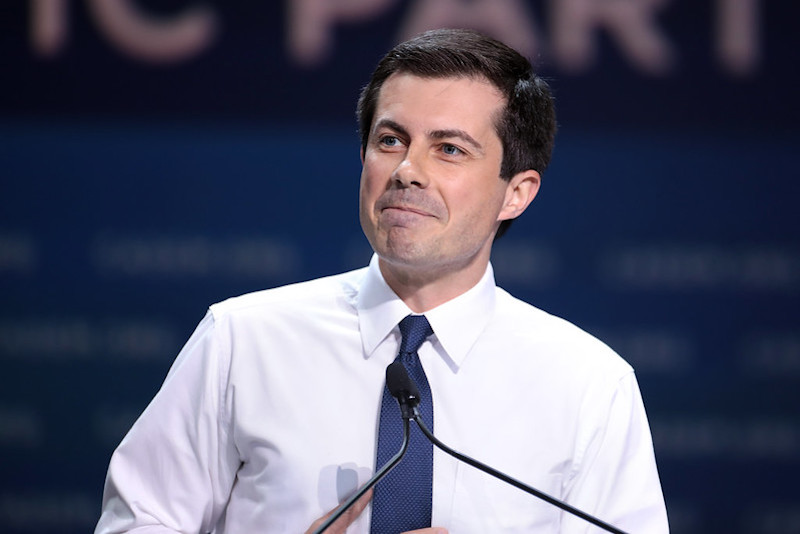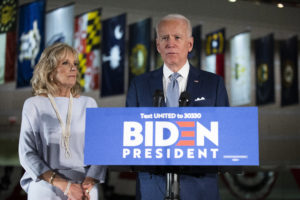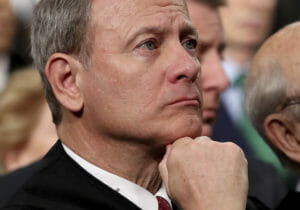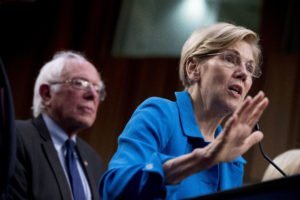Pete Buttigieg Is the Past
He may be the youngest candidate in the race, but as Tuesday’s debate made clear, the mayor's politics are as cynical as they are stale. Gage Skidmore / Flickr
Gage Skidmore / Flickr
It was the paradox that defined the fourth Democratic debate Tuesday night. Pete Buttigieg stood to benefit more than anybody from Joe Biden’s entirely forgettable performance, and yet with the possible exception of Biden himself, no one more vividly embodied all that is stale and sclerotic about the Democratic Party than the fresh-faced politician colloquially known as Mayor Pete.
Prior to the debate, Buttigieg threw punches to his left over health care, gun control and (perhaps most bizarrely) grassroots voters. And from the jump, he went right after Sen. Elizabeth Warren (D-Mass.), trotting out one Heritage Foundation-tested line after another on health care: that the overarching desire of the public in health care is to have choice, that higher taxes equal higher cost, and that Medicare for All would result in “kicking 150 million people off their health insurance.” It was a line of attack that earned the South Bend mayor and self-styled Heartlands whisperer rave reviews from the likes of the Republican National Committee.
But then Buttigieg described the defining feature of his “Medicare for All for those who want it” proposal—a glorified public option co-opting the language of single-payer, which Warren rightly dubbed “Medicare for All who can afford it”—as superior to the single-payer plan introduced by Sen. Bernie Sanders, I-Vt., and backed by Warren. “Our country will be horrifyingly polarized, even more than now, after everything we’ve been through, after everything we are about to go through, this country will be even more divided,” he intoned. “Why unnecessarily divide this country over health care when there’s a better way to deliver coverage for all?”
To accept this statement on its face is to brazenly ignore the history of health care reform in the United States. You don’t even have to go back to the first calls for single-payer under President Harry S. Truman; just look at the Affordable Care Act—a plan whose most controversial feature had once been a Heritage Foundation proposal—and the war that rages over it to this day. Any proposal expanding the government’s role in health care is still virulently opposed by both Republicans and health care profiteers, even if the proposed legislation carves out a space for private health insurance. Even Biden, who by all accounts did not want any part of another health care fight in the early days of the Obama administration, admitted as much later in the debate. “The greed and profiteering of those insurance companies, they are as much against my bill as they are anybody else,” Biden said, in response to a charge from Sanders that the public option doesn’t go far enough in taking on the industry. “They were strongly against Obamacare.”
Still, it’s imperative we remember that neither of these groups strangled the public option in its crib; instead, the culprits were right-wing Democrats, including Sens. Max Baucus and Joe Lieberman, along with the conservative Blue Dog Coalition in the House. Ten years later, it’s increasingly hard to believe that these Blue Dogs, whose campaign arm is run by the corporate donor-friendly Cheri Bustos, would find the political courage within themselves to pass a public option. In all likelihood, they would abandon health care reform altogether.
If the Trump administration’s repeated attacks on the Affordable Care Act have taught us anything, it’s that incrementalism does not work, and yet Buttigieg clings to this myth. Pundits have sneered at Sanders’ pledge to use his bully pulpit to force Congress’ hand, but his 2020 rival is employing the same basic logic, albeit without even pretending as if he wants to mobilize working-class voters. “We are at the cusp of building a new American majority to actually do things that congressmen and senators have been talking about with almost no impact for my entire adult life,” Buttigieg said. (He was criticizing O’Rourke’s gun buyback plan, but the sentiment could be applied just as easily to health care.)
Buttigieg is a Harvard graduate and a former McKinsey associate, and like so many of his class, his entire approach to politics—that both sides have to have buy-in for anything to work—is deeply cynical. His program would run into all of the same obstacles that Sanders’, Warren’s, and others’ would, so it’s difficult not to view these plays at “getting things done” and being “realistic” as anything other than a signal to donors and moderates alike that he won’t rock the boat too much. If Democrats tried to pass Medicare today, conservatives would deride it as socialism, just as the conservatives of the time did. Buttigieg knows this, of course, and he’s acknowledged as much on the debate stage.
There is no public policy in modern American history on which progressives, moderates and conservatives have found themselves in agreement of what the goal should be, much less what the solution is. There are people who are OK with the status quo—tens of millions of people lacking basic health insurance—and there are people who aren’t. It might be inconvenient for Buttigieg that this is such a black and white question, but that doesn’t make it any less real.
Tuesday’s debate was Buttigieg’s chance to show he actually had something to offer, that he wasn’t being propped up “Weekend at Bernie’s”-style by high-dollar donors. Instead, he meshed the painfully outdated rhetoric of past Democratic campaigns—Barack Obama’s appeal for “post-partisanship” springs to mind—with the pessimism and limited imagination that has come to define the center of his party.
Pete Buttigieg might be the youngest person in this race, but his politics are a relic. Unfortunately for him, voters appear to have moved on.
Your support matters…Independent journalism is under threat and overshadowed by heavily funded mainstream media.
You can help level the playing field. Become a member.
Your tax-deductible contribution keeps us digging beneath the headlines to give you thought-provoking, investigative reporting and analysis that unearths what's really happening- without compromise.
Give today to support our courageous, independent journalists.






You need to be a supporter to comment.
There are currently no responses to this article.
Be the first to respond.